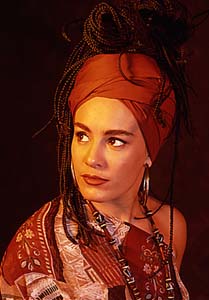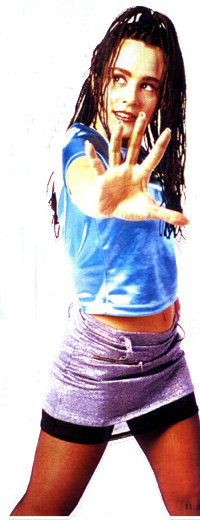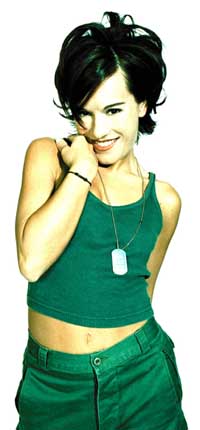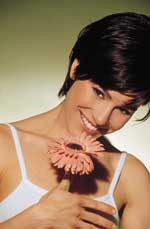 |
 |
 |
 |
 |
 |
 |
 |
 |
 |
 |
 |
 |
 |
 |
 |
 |
 |
 |
| Alexia's Biography |
|
|
|
 |
|
| Alessia Aquilani was born in La Spezia (Italy) on the 19th of May 1967 to proud parents Agustinio and Wilma Aquilani. As a small child she began singing in various places in her hometown. Her family, noticing at such an early age her singing and performing talents, decided to point her in the direction of a musical career. It was during this time that Alessia entered and won more than fifty competitions achieving the title of "Little wonder"! At the age of six, Alessia's sister Anna Maria was born. When Alessia was seven, she began studying piano and voice at school and when she was twelve she studied dance and in the meantime, she kept on doing shows in clubs, becoming familiar with the stage and live crowds. |
|
|
|
|
|
 |
|
|
After school she sang with some professional groups, performing in various European discos. In 1990, she entered the Dance World Attack (DWA) records group, at first as a studio vocalist, singing on the hit song "Please don't go" by Double you. Alessia took part in many DWA projects in 1992-1994 such as Digilove, Alexia Cooper, Due, Galactia and Fourteen 14. Alessia sung on many DWA tracks including "Gotta be mine", "Music is my life", "Let the night take the blame" and "Let you go". In 1993/1994 great success came. Roberto Zanetti, (aka Robyx) manager of DWA and producer of a string of hits, asked Alessia to take part in the "Ice MC" project. It was a musical project with a rapper and Alessia as the singer. All of Europe danced and sang to the songs "Take away the colour", "Think about the way" and "It's a rainy day" and everybody knew Alexia's sweet and clear voice. For the next two years Alexia found herself touring alongside Ice MC taking part in television shows and performing in more than three hundred concerts world wide. The song "Think about the way" was even used as part of the soundtrack for the cult film "Trainspotting". |
|
|
|
 |
|
|
|
|
In the meantime, critics, the mass media and fans all agreed that Ice MC's fame was all due thanks to Alessia's strong voice. So Robyx decided to abandon the Ice MC project around the time that Ian Campbell decided to leave Robyx for another producer. At this point Robyx created a song suitable for her purpose. To add a pinch of magic, her friend "Double you" sang a little part in this song entitled "Me and you", her first single which came out in August 1995. This new project for Alessia was bound to last for a long time, so Alessia decided on a new stage name for herself. Alessia decided to play on her name to create a more international sounding name and thus "Alexia" was born. In just days of it's release, it made waves everywhere, reaching number one in Italy and Spain. Meanwhile Ice MC's first record with his new producer was released and flopped and Ice MC was never heard of again. However by this time, Robyx and Alexia were working on the follow- up to"Me and you", the new single for the summer was called "Summer is crazy", and came out in May 1996. The song achieved first positions in all charts and became the signiture tune of "Festivalbar", the most famous Italian music festival. It was number one in Italy and Spain, Number 3 in Finland, top 20 in France, Top 40 in the rest of Europe. Without a doubt, the song was one of the greatest successes of the summer 1996. Meanwhile, in the USA "Me and you" was released on the Critique/ Popular records label. A new season was approaching and it was time to create a new song suitable for Alexia's incredible voice. In November 1996, the new song "Number one" came out. This was the third single, without a doubt, it was a smash, going to Number one in Italy and in many other countries. In January 1997 recording of her first album began. It was released in May 1997 together with a new single "Uh la la la" for the coming summer season with a videoclip that was shot in Miami (USA). "Uh la la la" was the summer song of the year and was played and danced to continuosly! It reached number one in Italy, Finland and Spain. Alexia's debut album "Fan Club"sold more than 600,000 copies and it was awarded many gold and platinum discs. and once more Alexia took part in Festivalbar. Thanks to careful promotion, Alexia became popular in every part of Europe. |
|
|
|
|
 |
|
|
|
|
In the USA, "Number one" was the second single, coming out in September 1997. Every record company was intrested in her, but Alexia continued working with her producer Robyx who wisely decided it was time to make the big jump. During Midem 1998, Robyx and Alexia singed a world-wide contract with Sony/Dancepool for future projects.
In March 1998, a remixed version of "Uh la la la" was released in the UK and was Alexia's first ever single to be released in the UK and became a huge success going straight into the top ten. The video was played constantly by MTV, whilst Alexia took part in all of the most important television shows, not forgetting "Top of the pops". This great achievement in the UK has put Alexia amongst the most important pop stars on an international level. The follow up "Gimme love" was released firstly in Italy, Finland and Spain in the March `98. Within no time it reached the number one position In Italy and Spain and number 4 in Finland. After breaking in at number 2 as a new entry in Italy, "Gimme love" managed to slot into the top spot at number one for a staggering five weeks! Alexia is seen as a protagonist at Festivalbar 1998, where she was the first to perform. After that, her second album "The Party" was released and by October had sold over 500,000 copies!! Alexia was later singed to Mariah Carey's record company Sony Crave in the USA, but Mariah dropped the label and Alexia was singed to the Sony Epic (Epidrome) label in the USA and Australia. In the summer of 1998, "The music I like" was released and proved to be yet another hit single, going to number one in Italy. In November of 1998, the final single from "The Party", "Keep on movin'" was released in Italy, Finland and Brazil to name a few of the countries. |
|
|
|
 |
|
|
|
"Keep on movin'" was even on the soundtrack of a famous Brazillian soap opera! In early 1999, Alexia returned to the recording studio to record her third album. For this album, Robyx decided to involve Marco Canepa, a famous Italian musician. In April `99, Alexia's new single "Change your life" was set to be released until DWA decided to change the new single to "Goodbye", this caused the release date to fall back a few months. March 1999 also saw hard promotion for Alexia in the USA were the original version of "Uh la la la" was released in May. "Goodbye", the first single taken from Alexia's third album "Happy" was released in Italy in July 1999 and in the rest of Europe in September/ October. The summer of `99 saw Alexia once again peform at Festivalbar, but most importantly saw the release of her new album "Happy" in late August. Once again Alexia had another hit album and by October "Happy" had gone gold in Italy alone. Also in August, Alexia visited Japan, where "The Party" was released and proved to be another huge success for Alexia. Late October saw the release of the second single from "Happy" which was the title track "Happy".
After months of promotional activity in Italy, Alexia revealed in February 2000 that she is planning to release a new style of song different to her previous releases. The result was "Ti amo Ti amo", a song not too different to "Uh la la la" and "Happy". The song was released in late May 2000 with a greatest hits album simply called "The Hits" which was released in June 2000. Shortly after the release of "The Hits", Alexia announced that she was leaving Robyx and DWA because she wanted to try out different styles. Although she continued to make live appearances in Italy, things became extremely quiet. However this was because Alexia was putting together her fourth studio album. In April, the song "Money honey" was first played on Italian radio and a couple of weeks later it was in the shops and the charts. Alexia's fourth studio album "Mad for music" was released to Italian audiences in June 2001 and a European release is expected to follow. |
|
|
|
|
 |
|
|
|
|
|




